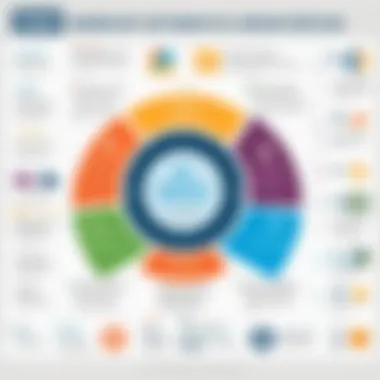Understanding Project Management Professional Certification


Intro
In today's fast-paced environment, the role of a Project Management Professional (PMP) becomes more vital. This concept extends beyond mere title; it encapsulates the essence of managing complex projects efficiently and effectively. The movement towards agile practices and digital transformation has brought an expanded need for PMPs across all industries. Understanding what it means to be a PMP is essential for professionals looking to advance in their careers.
A Project Management Professional is certified through the Project Management Institute (PMI). This certification validates one's capacity to manage projects, blends knowledge and skills, and embodies essential project management principles. As industries evolve, the demand for PMPs only increases, making this an important topic of discussion.
Key Software Features
For PMPs to succeed, they rely on various software tools designed to streamline their workflows. Understanding these tools is necessary for enhancing project outcomes.
Essential functionalities
Project management software typically features core functionalities that include:
- Task assignment: Assigning tasks to team members with clear due dates.
- Timeline visualization: Gantt charts or Kanban boards for tracking project progress.
- Resource allocation: Managing team workloads efficiently.
- Budget tracking: Keeping expenses under control to maintain profitability.
- Reporting: Generating reports on project status and performance.
These essential features lay the foundation for effective project management, allowing professionals to monitor progress and adjust as needed.
Advanced capabilities
As the field of project management grows, software developers incorporate advanced capabilities to meet evolving needs. These may include:
- Collaboration tools: Real-time communication channels for teams.
- Risk management modules: Identifying potential risks early in the project lifecycle.
- Integration with other software: Facilitating seamless data exchange with tools like Slack, Jira, and Microsoft Teams.
- Mobile access: Enabling PMPs to manage projects on-the-go through mobile applications.
These advanced capabilities allow PMPs not only to manage their projects but also to foster collaboration and innovation within their teams.
The Importance of PMP Certification
PMP certification is recognized worldwide as a standard for project management excellence.
The benefits of obtaining this certification include:
- Global recognition: Validates professional skills across multiple industries.
- Career advancement: Opens doors for higher-level positions.
- Networking opportunities: Connects PMPs with a community of professionals.
- Increased earning potential: Generally leads to higher salaries compared to non-certified peers.
Having a Project Management Professional certification can significantly impact one’s career trajectory. It signals to employers a deep understanding of project management fundamentals.
Common Misconceptions about Project Management
Despite its importance, several misconceptions about project management persist. One common belief is that project management is solely about keeping tasks on track. In reality, it encompasses risk management, stakeholder communication, and resource allocation. Another myth is that PMPs are solely accountable for the success or failure of a project. In truth, a project is a collaborative effort where multiple interests converge.
Understanding these misconceptions is crucial for appreciating the complexity and value of project management.
Finale
The role of a Project Management Professional is indispensable in today’s dynamic work environment. With a blend of essential software skills, a solid understanding of project management principles, and an awareness of common misconceptions, PMPs can navigate the challenges that come with managing projects.
As technology continues to shape the industry, the significance of PMPs will only become more pronounced. Acquiring the PMP certification not only validates one's skills but also prepares professionals for future challenges in the landscape of project management.
Defining Project Management Professional
Defining what a Project Management Professional (PMP) is crucial because it lays the foundation for understanding the competencies required for effective project management. The PMP designation is recognized globally and signifies that an individual possesses both theoretical knowledge and practical experience in managing projects.
This article emphasizes how a PMP can differentiate itself through the set of skills and methodologies. It also outlines the responsibilities PMPs carry, which include planning, executing, and finalizing projects within various industries. Beyond understanding basic project parameters, a PMP brings a level of professionalism and structure that enhances project success rates.
What Does PMP Entail
A Project Management Professional integrates various methodologies and tools that shape project outcomes. This designation encompasses a range of responsibilities, including:


- Project Planning: Developing detailed project plans outlining scope, timelines, and resources needed.
- Execution: Implementing the project plans, leading teams, and managing resources effectively.
- Monitoring and Controlling: Keeping track of project progress and adapting to changes as necessary.
- Closing Projects: Ensuring successful project completion and conducting post-project evaluations.
Being a PMP involves adhering to the PMBOK® Guide principles, which provide a structured approach to project management. PMPs are equipped to handle unexpected challenges, ensuring projects meet their objectives.
Key Characteristics of a PMP
Understanding the characteristics of a Project Management Professional aids in recognizing why they are pivotal in any organization. Some core traits include:
- Leadership: A PMP must be an effective leader who can motivate teams and drive project success.
- Communication Skills: Clear and concise communication is essential for coordinating with team members and stakeholders.
- Problem-Solving Ability: Projects often face hurdles. A PMP must quickly analyze situations and come up with effective solutions.
- Time Management: Managing deadlines and schedules is critical to keeping projects on track.
- Adaptability: As projects evolve, a PMP must be flexible to change plans and processes where needed.
"A Project Management Professional is more than a credential; it reflects a commitment to excellence in project management practice."
The rigor of the PMP certification process ensures that only qualified individuals attain this status. Developing these characteristics takes time and experience, but the benefits they bring to organizations are immeasurable.
The Importance of PMP Certification
Understanding the significance of PMP certification is crucial for anyone involved in project management. This certification not only demonstrates a professional's competence but also enhances the credibility of project management as a profession. Organizations often prioritize candidates who possess this qualification, leading to better job prospects and advancement opportunities.
Furthermore, obtaining PMP certification reflects an individual's commitment to the field, providing a solid foundation in project management methodologies and practices. It empowers professionals to lead projects effectively and efficiently, ultimately driving organizational success.
Recognition in the Industry
PMP certification is recognized worldwide and respected across industries. It signifies that a project manager has undergone rigorous training and possesses comprehensive knowledge of project management standards. Companies often seek PMP-certified individuals for key roles in projects, understanding that these professionals bring valuable skills in planning, executing, and completing projects successfully.
A key aspect of this recognition is the global standard set by the Project Management Institute (PMI). Many major companies include PMP certification as a requirement in their job postings. This not only elevates the importance of the certification but also cements its reputation among stakeholders and clients.
"PMP certification signifies a uniform standard of knowledge and experience, appreciated by employers worldwide."
Impact on Career Advancement
The impact of PMP certification on career advancement cannot be overstated. Statistics indicate that PMP-certified professionals frequently enjoy higher salaries compared to their non-certified counterparts. According to various studies, PMPs can earn up to 20% more than their peers without certification.
Obtaining this certification also opens doors to new job opportunities. Many organizations view it as a marker of professionalism, leading to roles with greater responsibilities. PMPs often rise to senior management positions faster, as they are perceived to have the skills needed to manage complex projects and diverse teams.
In summary, PMP certification serves as a significant vessel for career growth, providing professionals with exceptional qualification to navigate the competitive job market effectively.
Project Management Framework
The project management framework serves as a foundation for successful project execution. It lays out the structure and methodology that project managers must follow to ensure objectives are met efficiently. Understanding this framework is imperative for anyone looking to delve deep into the discipline of project management. It encompasses processes, tools, techniques, and methodologies necessary for delivering projects on time and budget.
A robust project management framework provides clarity and facilitates better decision-making. It allows project managers to align project goals with organizational strategy. This congruence is important for supporting overall business objectives.
Processes and Methodologies
Processes within the project management framework are systematic and consist of phases including initiation, planning, execution, monitoring, and closure. Each phase contains specific activities and outputs, making it easier for project teams to track progress.
- Initiation: This phase defines the project and secures approvals and resources.
- Planning: Here, project managers outline the scope, schedule, and budget.
- Execution: This involves carrying out the project plan and coordinating resources.
- Monitoring: During this step, project managers oversee the ongoing processes to ensure alignment with goals.
- Closure: This phase involves finalizing all activities and delivering the project outputs.
Methodologies play a crucial role in guiding teams through these processes. The most common methodologies include Agile, Waterfall, and Scrum. Each method has its advantages and is chosen based on project complexity and team dynamics.
For example, Agile promotes flexibility and iterative progress, making it popular in software development. Conversely, the Waterfall method emphasizes a linear approach, best suited for projects with well-defined stages. The choice of methodology can significantly affect the project's outcome.
Tools and Techniques
Utilizing the right tools and techniques is essential for effective project management. These tools help in planning, executing, and monitoring projects, as well as in resource management and communication. Examples of standard tools include Microsoft Project, Asana, and Trello.
Common Techniques Include:
- Gantt Charts: These visualize project timelines and help assess progress over time.
- Critical Path Method (CPM): Used to determine the sequence of project activities that directly impacts the project duration.
- Risk Management: Identifying potential project risks and developing mitigation strategies is crucial for minimizing negative impacts.
- Earned Value Management (EVM): A technique for measuring a project's performance by comparing planned progress to actual progress.


Each tool and technique contributes to the overall goal of delivering successful projects. Familiarity with them enhances a project manager's capability to handle challenges effectively, ensuring both organizational and client satisfaction.
The Role of a PMP in Organizations
The Project Management Professional (PMP) plays a critical role in the successful execution of projects within organizations. Their expertise ensures that projects align with broader business goals, meet deadlines, and stay within budget. PMPs facilitate structured approaches to project management, which ultimately enhance productivity and communication across teams.
The significance of a PMP in organizations stretches beyond administration. They foster leadership and accountability, which can transform project outcomes. Understanding the complexities of various projects, PMPs also adapt methodologies to fit specific organizational contexts. This tailored approach to project management can result in increased efficiency and morale among team members, as they work under strong guidance.
Additionally, PMPs serve as mediators between project teams and external stakeholders. Whether it is clients, suppliers, or upper management, having a PMP at the helm of communication ensures that all parties are well-informed and aligned with the project's direction and expectations. The role becomes even more pronounced in industries where project scopes frequently change, demanding continual adaptation.
Leadership and Team Management
Leadership is central to the effectiveness of a PMP. A skilled PMP does not merely manage tasks; they inspire their teams towards a common goal. They establish clear roles and responsibilities within the project team which leads to enhanced accountability amongst team members. Through strong leadership, PMPs can navigate conflicts effectively, promoting collaboration and cohesion.
Key leadership practices involve:
- Setting Clear Objectives: Clear goals provide focus and direction to the team, an essential factor for project completion.
- Encouraging Collaboration: PMPs create an environment that emphasizes teamwork, where individuals feel comfortable sharing ideas and concerns.
- Providing Feedback: Timely and constructive feedback helps team members grow and perform better throughout the project.
By implementing these practices, PMPs can greatly improve team dynamics, leading to more successful project outcomes.
Communication and Stakeholder Management
Effective communication is a hallmark of successful project management. PMPs are trained to engage with different stakeholders, which includes maintaining transparency and ensuring everyone is kept in the loop. The ability to communicate effectively can directly influence the project's success, as miscommunication often leads to project delays or misunderstandings.
In stakeholder management, PMPs utilize strategic communication techniques, such as:
- Regular Updates: Consistent progress reports help stakeholders stay informed about the project's status.
- Tailored Messaging: Understanding the audience allows PMPs to adjust communication styles for different stakeholders, enhancing relatability and connection.
- Listening Skills: Actively soliciting feedback and concerns from stakeholders fosters an environment of trust.
The careful handling of communication with stakeholders not only smooths the way for current projects but also builds lasting relationships that can be beneficial for future endeavors.
"In project management, effective communication is pivotal; it builds trust and ensures alignment with stakeholder expectations."
The role of a PMP is multifaceted, crucial for the smooth operation of projects and the alignment of team goals with those of the organization.
Steps to Achieve PMP Certification
Achieving PMP certification is a pivotal moment in the career of any project management professional. It validates the skills and knowledge needed to lead projects efficiently and successfully. This section explores the specific steps involved in obtaining this important credential, outlining the requirements candidates must meet and strategies for effective examination preparation.
Prerequisites for Candidates
To pursue PMP certification, candidates must meet certain prerequisites. Understanding these requirements can greatly influence one's journey towards certification. The Project Management Institute (PMI) outlines distinct pathways depending on the candidate's level of education.
- Educational Background:
- Project Management Experience: Relevant experience is crucial. Candidates should track their project involvement accurately, focusing on the roles they played during those projects—indicating their leadership skills and contributions to successful outcomes.
- Formal Education: This can include university courses, seminars, or structured training programs in project management. It's essential to select reputable sources to enhance learning quality.
- For those holding a four-year degree, there must be at least 36 months of leading projects and 35 hours of project management education.
- For candidates with a high school diploma or associate degree, the requirement increases to 60 months of project leadership experience, along with the same 35 hours of project management training.
Compliance with these prerequisites establishes a solid foundation. Meeting these criteria signifies a candidate's commitment to professional development.
Preparing for the Examination
The preparation for the PMP examination requires structured planning and determination. Below are key strategies that candidates can utilize to enhance their readiness.
- Study Material: Utilize resources such as the PMBOK Guide, which is the primary reference for the exam. Supplement this with online courses and workshops that provide interactive learning.
- Create a Study Plan: Candidates should devise a comprehensive study schedule that allocates time for various topics. Regular reviews and practice exams can significantly enhance recall and understanding.
- Join Study Groups: Participating in study groups can provide motivation and create a collaborative learning environment. Discussion with peers often elucidates concepts that may be challenging when studied in isolation.
- Practice Tests: Taking full-length practice exams under timed conditions helps candidates acclimate to the exam format. Review results to identify areas needing improvement.
- Focus on Weak Areas: After practice exams, it's important to analyze performance. Spend additional time on concepts that are particularly challenging.
- Exam Day Preparation: The day before the exam, ensure all logistics are taken care of, such as transporting necessary identification and confirming exam times. Rest well to be mentally sharp during the examination.
"Preparing for the PMP exam is as much about strategy as it is about knowledge. A structured approach often leads to success."
Following these preparation strategies positions candidates not just to pass the exam but to fully understand the depths of project management. This knowledge is integral to becoming an effective Project Management Professional, ultimately leading to career advancement in this competitive field.


Common Misconceptions about PMPs
Understanding the common misconceptions about Project Management Professionals (PMPs) is essential for appreciating their role and impact in various industries. Misunderstandings can lead to missed opportunities for organizations and individuals alike. It is crucial to clear up these misconceptions to ensure that both aspiring PMPs and employers can effectively leverage the skills that PMPs bring to the table.
Myths and misunderstandings surrounding PMPs often relate to the certification process itself and the nature of project management work. These misconceptions can affect perceptions of the value of PMP certification, leading to either undervaluation or overvaluation of the role.
By addressing these erroneous beliefs, we can provide clarity and establish a realistic view of what PMPs do, their qualifications, and how they contribute to project success.
Myths versus Reality
One popular myth is that PMP certification guarantees immediate success and a high-paying job. While PMP certification undoubtedly enhances a professional's credibility and job prospects, it does not function as a magic ticket to instant career advancement. Candidates must also possess relevant experience and skills to harness the benefits that PMP certification brings. Here are some common misconceptions followed by the corresponding realities:
- Myth: All PMPs are the same.
- Myth: PMP is only for large organizations.
- Myth: Certification is all that matters.
- Reality: PMPs come from diverse backgrounds and industries, each with unique experiences and skill sets. The certification does not equate to identical knowledge or capability.
- Reality: Project management principles apply across various scales and sectors, including small businesses and nonprofit organizations. PMPs are valuable in any setting.
- Reality: While the certification holds significant weight, real-world experience and continuous learning are equally vital for success in project management.
By understanding these myths versus reality, individuals can make informed decisions about pursuing PMP certification and its relevance to their career aspirations.
Understanding the Scope of Work
The scope of work for PMPs is often misunderstood. Some people believe that project management only entails overseeing project execution. In reality, PMPs are involved in several critical phases that start long before a project launch.
- Initiation: PMPs identify project needs, help define project goals and objectives, and gather resources necessary for successful project delivery.
- Planning: They are responsible for making strategic plans that guide the entire project, including timelines, budgets, and resource allocation.
- Execution: PMPs lead teams, ensuring alignment with project goals while managing risks and challenges that arise.
- Monitoring and Controlling: Throughout the project lifecycle, PMPs continually assess the project's progress and make adjustments as needed to keep it on track.
- Closing: Finally, they ensure that all aspects of the project are completed satisfactorily and provide documentation and lessons learned for future endeavors.
The Future of Project Management Professionals
The evolving landscape of project management is shaped greatly by changes in technology, methodologies, and market demands. The future of Project Management Professionals (PMPs) holds significant implications for organizations and individual practitioners alike. Understanding this future becomes increasingly important to stay competitive in an ever-changing environment. This section will explore key areas such as technology adaptation and emerging trends which are pivotal to the ongoing relevance of PMPs.
Adapting to Technology and Innovation
Technology is at the forefront of transformation within the field of project management. PMPs must now harness tools that automate routine tasks, enhance communication, and provide analytics for informed decision-making.
Some of the latest innovations impacting project management include:
- Project Management Software: Tools like Microsoft Project and Asana are widely used to plan, execute, and track project progress efficiently.
- Artificial Intelligence: AI can analyze data and predict project risks before they become critical issues.
- Cloud Computing: It allows PMPs to access project documentation from anywhere, promoting remote collaboration.
- Agile Methodologies: These emphasize adaptability to change, making technology an integral part of every phase of project execution.
Adapting to these technologies not only optimizes workflows but also empowers PMPs to deliver outcomes more effectively. The ease of collaboration through digital platforms fosters a more connected approach to project execution, allowing teams to respond swiftly to changing circumstances. Training and continuous learning in these technologies is crucial for future success.
Emerging Trends in Project Management
Several trends are reshaping project management that PMPs must embrace to remain competitive:
- Agile and Hybrid Methodologies: Agile approaches are increasingly used across industries due to their flexibility. Hybrid models combine traditional and agile techniques to cater to project needs effectively.
- Focus on Sustainability: There’s an increasing recognition of the need to balance project goals with environmental and social responsibilities. PMPs will need to integrate sustainable practices into project planning and execution.
- Remote Work Management: The shift to remote work has created new dynamics in leadership and team management. PMPs must develop skills to manage distributed teams, ensuring communication and motivation.
- Data-Driven Decision Making: The capacity to gather and analyze data is reshaping how projects are monitored and evaluated. PMPs must be proficient in leveraging data analytics tools to enhance project outcomes.
"The future of project management lies at the intersection of adaptation and innovation, where professionals continuously evolve with technological advancements."
Understanding these trends and technology shifts is crucial for PMPs to lead projects effectively. Taking proactive steps towards embracing these changes will not only enhance their skill sets but also prepare organizations for greater challenges ahead.
End and Key Takeaways
Understanding the role of Project Management Professionals (PMPs) is critical in today's dynamic work environment. This article emphasizes not only what being a PMP entails but also highlights how their expertise enhances organizational efficiency and project success.
Summary of Key Points
- PMP Certification: The PMP certification represents a strong commitment to a set of standardized project management practices. It is widely recognized in virtually all sectors, reinforcing the credentials of the individual.
- Core Competencies: The successful project manager must exhibit distinct qualities such as leadership, communication skills, and adaptability. These traits are crucial in navigating complex project landscapes.
- Impact on Career: Attaining a PMP certification often leads to career advancement opportunities, including higher salary potential and better job security.
- Misconceptions Cleared: Many misconceptions surround PMPs, particularly regarding their role's scope and responsibilities, which often leads to misjudgment about their contribution to organizations.
- Future Trends: The landscape of project management is evolving with technology. PMPs must stay abreast of emerging tools and methodologies to maintain relevance in their field.
Final Thoughts on PMP Certification
In closing, pursuing PMP certification not only cultivates professional growth but also fortifies the organizational framework by fostering leaders who can guide projects to fruition in a structured manner. As industries continue to adapt and technology becomes more integrated in project dynamics, the significance of PMPs will only grow. Their capability to bridge communication across stakeholders and manage team dynamics effectively is invaluable.
The ongoing investment in professional development in project management should be considered essential for long-term success. As the field evolves, so does the potential for innovation, making it imperative for PMPs to continually evolve in their roles.



